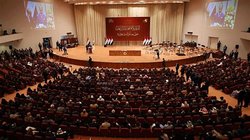 A high-ranking Iraqi official has stressed that the Baghdad government will not normalize diplomatic relations with the Tel Aviv regime, unless Israeli officials sign a deal with the Palestinians, which would pave the way for the establishment of an independent Palestinian state with Jerusalem al-Quds as its capital.
A high-ranking Iraqi official has stressed that the Baghdad government will not normalize diplomatic relations with the Tel Aviv regime, unless Israeli officials sign a deal with the Palestinians, which would pave the way for the establishment of an independent Palestinian state with Jerusalem al-Quds as its capital. RNA - “Iraq will not join the Arab countries that promote the establishment of relations with Israel, as long as the establishment of a true and full Palestinian state with Jerusalem (al-Quds) as a capital, an airport, a flag and an anthem is not guaranteed,” Israel’s English-language daily newspaper The Jerusalem Post quoted the unnamed official as saying.
Hebrew-language Hadashot television network asserted on January 6 that three delegations from Iraq had visited the Israeli-occupied territories in recent months, the last of which arrived last December.
The delegations included a total of 15 influential people from Iraq, including local religious leaders, the report claimed.
The report stirred controversy in Iraq, where the deputy parliamentary speaker demanded a probe to identify those who had crossed a “red line.”
Hassan Karim al-Kaabi called in a statement for “an investigation... to identify those who went to the occupied territory, particularly if they are lawmakers.”
“To go to the occupied territory is a red line and an extremely sensitive issue for all Muslims,” the statement pointed out.
Iraq does not recognize Israel and is technically in a state of war with it.
Israel and several Arab states have had secret contacts for years, but the two sides have stepped up their attempts to bring their clandestine relations out in the open.
Earlier this month, a US-organized summit in the Polish capital of Warsaw brought together Israeli Prime Minister Benjamin Netanyahu and representatives from a number of Arab states, including Oman, Morocco, Saudi Arabic, the United Arab Emirates, Bahrain, Qatar, Jordan, Egypt, Tunisia and Kuwait, among other participants.
Following the event, Netanyahu said statements by Arab leaders at the so-called Middle East security conference have laid the groundwork for the Arab public to accept normalization of ties with Israel.
The Israeli regime recently re-launched a “virtual embassy” in a bid to “promote dialogue” with the Persian Gulf Arab states.
Israeli Prime Minister Benjamin Netanyahu in late November last year visited Oman, where he met Sultan Sayyid Qaboos bin Said Al Said at the Bait al-Barakah Royal Palace in the coastal city of Seeb near the capital Muscat.
The Jerusalem Post reported that the two men had discussed ways to advance the so-called Middle East peace process as well as matters of mutual interest.
847/940